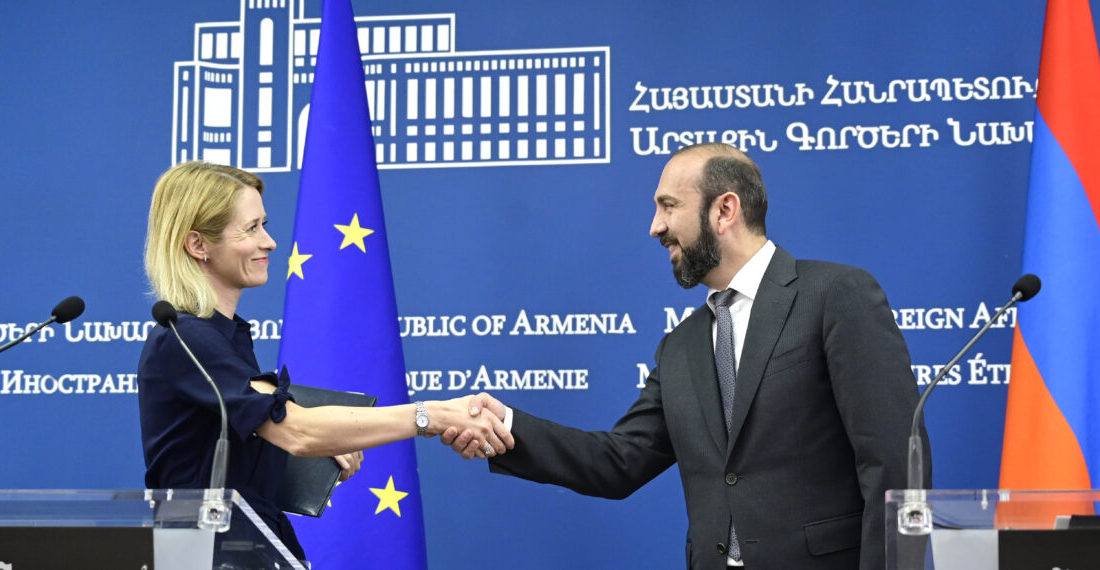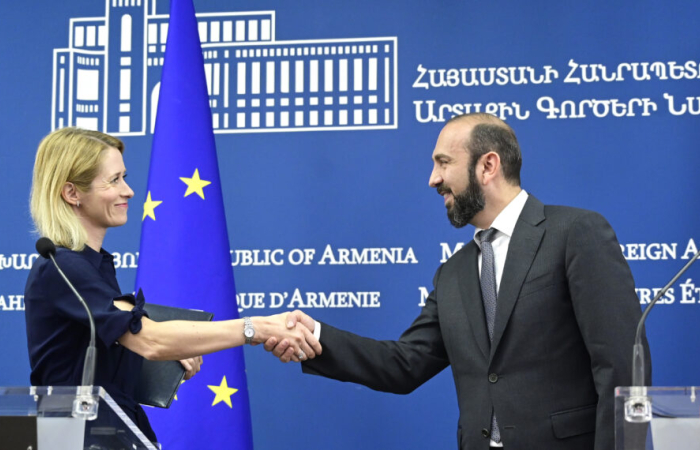EU High Representative for Foreign Affairs and Security Policy Kaja Kallas has ended her official visit to Armenia after signing a partnership agreement with authorities in Yerevan. Following talks with Armenian Foreign Minister Ararat Mirzoyan, a joint press conference was held in which the media was briefed about an agreement outlining Armenia’s participation in the European Union’s Common Security and Defence Policy crisis management operations. According to Kallas, the document envisions Armenia’s participation in EU missions around the world.
The agreement is a vivid example of mutual readiness to expand the Armenia-EU partnership agenda and it demonstrates Armenia’s commitment to making a constructive contribution to global security, stability, and peace, Mirzoyan stated during the press conference.
According to Armenia’s Minister of Foreign Affairs, in addition to the signing of the framework agreement, two more achievements have been recorded during the visit by Kallas. These are the completion of negotiations on the new partnership agenda, and the launch of consultations in the field of defense and security. The launch of defense and security consultations, he noted, is a “decisive step” as it aims to align cooperation with current challenges.
“In this context, I would like to particularly highlight cooperation aimed at strengthening Armenia’s defense capabilities, resilience, and the further development of democratic institutions, which also includes areas such as combating hybrid threats and disinformation”, Ararat Mirzoyan stated.
“Armenia and the European Union have successfully concluded negotiations on a new partnership agenda. This is an ambitious document that will complement and further deepen the bilateral Armenia-EU agenda through new areas of cooperation. At the same time, it will contribute to the effective implementation of the Comprehensive and Enhanced Partnership Agreement between Armenia and the EU”, Mirzoyan added.
According to the Kaja Kallas, the document outlines additional areas, directions, and instruments of cooperation. The new agenda defines our priorities in the areas of economic development, security, and resilience”, added Kallas.
The EU High Representative stated that she came to Yerevan with a clear message: the EU and Armenia have never been closer than they are now. Kaja Kallas emphasised the importance of Armenia’s continued commitment to democracy and freedom, especially in the face of hybrid threats and external interference. She stressed that the European Union is ready to support Armenia in this critical moment.
According to JAMnews, journalists asked her about the current status of the European Peace Facility assistance to Armenia and about Hungary’s position this time, after it vetoed the aid in 2024.“The EU consists of 27 democratic countries, which complicates the decision-making process. Sometimes a country can block a decision. Yes, we have not yet made a decision, that is true. But we are working on finding a solution to this problem,” Kallas replied.
During the press conference, Foreign Minister Mirzoyan said the discussions with the EU High Representative focused on possible realistic steps toward implementing the bill on Armenia’s accession to the EU as well as issues related to the visa liberalisation process. They also discussed programmes to deepen economic ties between Armenia and the EU. Mirzoyan said that talks also touched on regional and Middle Eastern developments and the Armenia-Azerbaijan peace negotiation process.
“We also discussed with the High Representative initiatives implemented with EU participation in the field of regional communications. I emphasised the comparability and potential complementarity of the ‘Global Gateways’ strategy and the Armenian government’s ‘Crossroads of Peace’ project,” Mirzoyan stated.
Media reports in Armenia also noted that Kallas urged her counterpart not to let his guard down and keep an eye on threats posed by neighbouring Russia, including the Kremlin’s disinformation and interference in the region, as seen in the electoral and political processes of a number of countries such as Georgia, Moldova and Romania.
Mirzoyan said he had instructing Moscow to stay out of Armenia’s domestic affairs and noted the arrest of Archbishop Bagrat Galstanyan, a prominent figure in the Armenian Apostolic Church and leader of the anti-government opposition, for his alleged involvement in a coup attempt that Yerevan does not exclude could be supported by the Kremlin.






